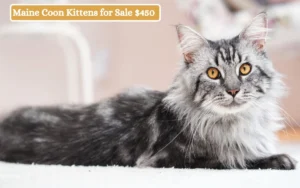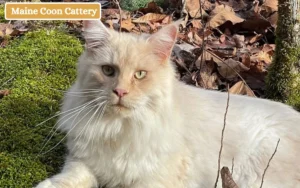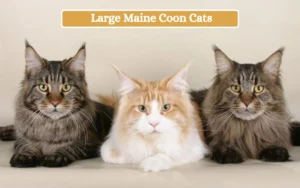Are Maine Coon Cats Hypoallergenic? Discover Key Facts and Allergy Management Tips!

Are Maine Coon Cats Hypoallergenic? Your Complete Guide to Owning a Maine Coon with Allergies
You’re not the only person who is thinking about getting a Maine Coon but is worried about allergies. Are Maine Coon cats hypoallergenic? is a question that many people have. The answer is more complex than you may expect. I’ll discuss what I’ve seen and experienced in this guide, along with specifics on allergies and Maine Coons.
Table of Contents
Hypoallergenic Cats: What Does It Mean?
When people talk about hypoallergenic cats, they usually refer to breeds that produce fewer allergens. A protein found in cat urine, skin, and saliva known as Fel d 1 is the main cause of allergies in cats. It’s interesting to note that this protein causes allergic reactions in people who are infected.
I used to think that owning any cat would lead to sneezing fits and itchy eyes, but learning more about this protein changed my perspective. Some cats are more enjoyable for allergy sufferers because they produce less Fel d 1 and shed less dander, while no breed is completely allergy-free. Even cats of the Siberian or Balinese breeds, which are frequently marketed as hypoallergenic, may cause allergy reactions in those who are sensitive.
Maine Coon Allergies: What to Expect
However their size, charm, and stunning hair make them popular pets, Maine Coons can be hazardous for people with reactions due to their rich coat. When I first saw a Maine Coon, I recall being amazed by their gorgeous look and kind nature. I quickly discovered that their thick fur may retain dander, which might increase allergy symptoms.
Large cats, Maine Coons can have long, heavy fur, particularly in places like their bushy tails and the ruff around their upper bodies. Despite being a pleasure to pet, this lovely coat can retain allergens like hair and the pollen, which can cause problems in people with sensitivity. As I got to know this breed, I found that managing allergens was crucial for maintaining a healthy environment.
Are There Hypoallergenic Cats?
While some breeds, such as the Siberian or Balinese, are promoted as hypoallergenic, they can nevertheless cause problems in people who are sensitive. Many cat owners I’ve spoken to have allergies, but they select breeds they can live with. For example, despite the fact that a Siberian is the best option for her allergies, my neighbor occasionally experiences small responses to her pet.

It’s essential to note that everyone reacts differently to allergens. Some people might find certain breeds, like the Maine Coon, easier to live with than others. In my experience, a Maine Coon would cause less allergic reactions than a short-haired breed, such as a Domestic Shorthair. This surprised me and shows the variability of individual responses.
Recognizing Cat Allergy Symptoms
If you suspect you might have cat allergies, look out for these common symptoms:
- Sneezing and a Runny Nose: Often the first signs that something is off.
- Dry or Itchy Eyes: An allergic reaction may be the cause of your eyes feeling like they’re on fire.
- Skin Rash or Hives: Some individuals develop localized skin reactions, especially if they’ve been petting the cat.
- Coughing or Difficulty Breathing: This can be particularly concerning and may require immediate medical attention.
After experiencing these symptoms when I first obtained a cat, chose to learn more about how one lives peacefully with my kitty friend. My allergies were equally apparent as the happiness when I brought my Maine Coon home for the first time, as I can still clearly recall. I had to learn to be responsible in managing my symptoms because it was a difficult balance to strike.
When to See a Doctor for Cat Allergies
If you experience persistent allergy symptoms, such as chronic sneezing or asthma-like symptoms, it may be time to consult a healthcare professional. They can conduct tests to determine your specific allergies and suggest treatments, including antihistamines or even immunotherapy.
In my experience, being aware of my allergies enabled me to make well-informed decisions regarding pet ownership. After doing a skin prick test, my allergist verified that I was allergic to cat dander, including the annoying Fel d 1 protein. I was able to manage my symptoms much better once the doctor suggested a daily antihistamine.
Are Maine Coons Hypoallergenic?
In short, Maine Coons are not hypoallergenic. They produce the same levels of Fel d 1 protein as other cats, and their dense fur can retain dander, making them a challenge for allergy sufferers. Despite this, some owners discover that because Maine Coons are calmer and require less frequent grooming than more energetic breeds, they are easier to live with than other breeds.
Many owners of Maine Coons that I’ve known enjoy their kind nature and come up with creative methods to deal with their allergies. A friend of mine who owns a Maine Coon and supports her grooming routine says that regular brushing significantly reduces the amount of hair and stray fur in her home. She spends a few minutes each day grooming her cat, and the results are amazing.
Why Aren’t Maine Coons Hypoallergenic?
The misconception that Maine Coons might be hypoallergenic often stems from their friendly personalities and physical appearance. Unfortunately, they still produce allergens through grooming and shedding. Maine Coons have a reputation for being particularly affectionate, often forming strong bonds with their owners. More personal interaction as a result of this loving behaviour may make allergy symptoms more likely in those who are more sensitive.
My friend who has a Maine Coon frequently talks about the joy of snuggling with her cat, but she also acknowledges the need for constant vigilance. She uses a humidifier in her living room to help filter out allergens and has a fur brush close at hand to remove fur off her clothing. These minor changes can have a significant impact.
What If You Still Want a Maine Coon?
If you’re determined to welcome a Maine Coon into your home, there are several strategies to make living together more comfortable. Start with regular grooming sessions to minimize shedding and dander. I’ve found that grooming not only reduces allergens but also strengthens the bond with my cat.
You might also want to establish cat-free zones in your home. For instance, creating a sanctuary, like a bedroom or an office, where your Maine Coon isn’t allowed can help you escape allergens when needed. This is particularly useful for those nights when you’re feeling particularly sensitive.
Consider investing in air purifiers with HEPA filters. In my home, I have a couple of these running, and I genuinely feel the difference. They help to filter out dander, dust, and other allergens from the air, making it easier to breathe.
12 Ways to Minimize Cat Allergies
The following useful tips will help you control your allergies while still having fun playing Maine Coon:
Regular Brushing
Grooming your Maine Coon daily can help reduce loose fur and dander in your home. I find that using a specific grooming brush made for cats with long hair really helps.
Bathing Occasionally
While not all cats enjoy baths, an occasional wash can help minimize allergen buildup. I’ve found that my Maine Coon tolerates baths surprisingly well, and it has helped with my allergies.
Use HEPA Filters
Investing in air purifiers with HEPA filters has helped me keep the air cleaner and more breathable.
Establish Cat-Free Zones
Creating areas in your home, like the bedroom, where the cat isn’t allowed can significantly reduce allergens.
Wash Hands After Handling
This simple step prevents transferring allergens to your face, reducing the chance of a reaction.
Avoid Carpeted Areas
Hard flooring is easier to clean and doesn’t trap allergens like carpets do. I opted for hardwood floors, which have made a noticeable difference.
Vacuum Frequently
I’ve made it a habit to vacuum regularly using a HEPA-filter vacuum to minimize dander on surfaces.
Wash Cat Bedding Often
Regularly cleaning your cat’s bedding can greatly decrease allergen buildup in your home.
Use Allergy-Reducing Cat Shampoo
There are shampoos designed to reduce allergens on your cat’s fur, which can be helpful. I’ve tried a few brands, and they seem to help with dander.
Apply Anti-Allergen Sprays
These products can help neutralize allergens on furniture and surfaces. I use them on my couch, where my Maine Coon loves to lounge.
Consult a Doctor
Prescription allergy medications can be invaluable for managing symptoms. My daily antihistamine has become a staple for me.
Consider Allergy Shots
For some, immunotherapy offers long-term relief from cat allergies. While I haven’t gone this route yet, I know several people who have benefited.
Final Thoughts
While Maine Coons are not hypoallergenic, owning one can still be possible for those with allergies, given the right precautions. By implementing regular grooming, utilizing air purifiers, and setting up designated cat-free zones, you can create a comfortable living environment.
The joy of sharing your life with such an affectionate and intelligent breed is well worth the effort. After all, the bond I share with my Maine Coon is one of the most rewarding experiences of my life. It’s all about finding the right balance and being proactive in managing allergies.
Faqs
Are Maine Coon cats hypoallergenic?
Maine Coon cats are not considered hypoallergenic, as they produce allergens that can trigger reactions in sensitive individuals.
What causes cat allergies?
Cat allergies are typically caused by proteins found in cat saliva, skin, and dander. When cats groom themselves, these proteins can become airborne.
Do Maine Coons shed a lot?
Yes, Maine Coon cats do shed, especially during seasonal changes. Regular grooming can help manage shedding and dander.
How can I minimize allergies if I have a Maine Coon?
You can minimize allergies by regularly grooming your cat, using air purifiers, cleaning your home frequently, and creating pet-free zones.
What are the signs of cat allergies?
Common signs of cat allergies include sneezing, itchy or watery eyes, coughing, and skin rashes.






2 thoughts on “Are Maine Coon Cats Hypoallergenic? Discover Key Facts and Allergy Management Tips!”